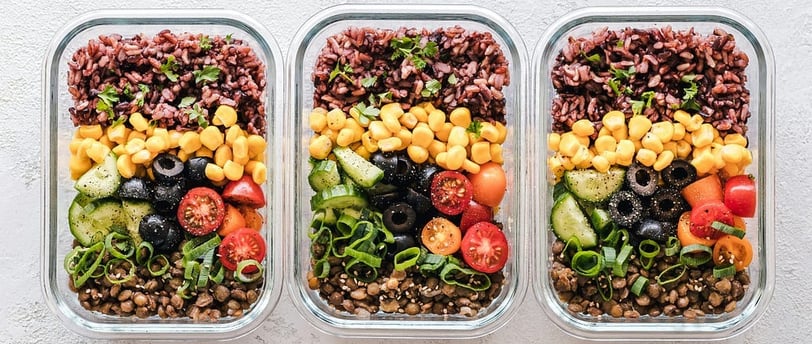Meal Prep Masterclass: 9 Tips for Healthy Eating
4/10/20256 min read


Introduction to Meal Prepping
Meal prepping, a strategic approach to food preparation, has emerged as a popular method among health-conscious individuals. It involves preparing meals in advance, allowing for better management of daily nutritional intake and fostering healthier eating habits. By dedicating a few hours each week to meal preparation, individuals can not only save time but also simplify their weekly routines.
One of the primary benefits of meal prepping is the substantial time savings it offers. With pre-portioned meals ready to go, there is less daily cooking and no need to scramble for quick, often unhealthy options during busy weekdays. This efficiency in meal preparation allows individuals to focus on other priorities without compromising their nutritional choices.
Moreover, meal prepping significantly contributes to reducing food waste. By planning meals in advance, one can effectively utilize ingredients purchased, ensuring nothing goes to waste. This thoughtful approach to food ensures that the purchased items are consumed in the intended period, contributing to both a healthier lifestyle as well as a more sustainable environmental footprint.
Planning ahead is a critical component of successful meal prepping. By taking the time to organize what meals to prepare for the week, individuals can ensure that they have balanced options readily available. This structural approach helps avoid the temptation of choosing unhealthy snacks or fast food options when in need of a quick fix. Having healthy meals prepared in advance not only promotes adherence to dietary goals but also supports overall well-being.
As we delve deeper into the intricacies of meal prepping, the following tips will serve as valuable tools in enhancing the overall experience, making it easier to embrace healthy eating habits consistently. The ensuing discussion on strategies and best practices will aid readers in establishing a sustainable meal prepping routine that facilitates long-term health benefits.
9 Essential Meal Prep Tips for a Healthier Lifestyle
Meal prepping is an influential strategy for maintaining a balanced diet and a healthier lifestyle. Below are nine practical tips that can enhance your meal preparation process, enabling you to make nutritious choices effortlessly.
1. Choose Airtight Containers: Invest in high-quality, airtight containers. These help preserve the freshness of your meals and prevent spoilage. Look for BPA-free plastic or glass containers, as they are often microwave and dishwasher-safe, allowing for convenience and safety.
2. Select Versatile Ingredients: Opt for ingredients that can be used in multiple dishes. For example, quinoa, brown rice, and various proteins can serve as the base for salads, stir-fries, and grain bowls. This not only minimizes food waste but also simplifies shopping.
3. Plan Balanced Meals: Ensure that each meal includes a source of protein, healthy fats, and carbohydrates. This keeps your meals well-rounded and satisfying. Incorporating a variety of vegetables further enhances nutrition while keeping your diet exciting.
4. Batch Cooking: Designate specific days to batch-cook meals. This practice not only saves time but also allows you to create larger quantities, which can be divided into single-serving portions. Consider making soups, stews, or casseroles that can be easily stored and reheated.
5. Make a Shopping List: Before heading to the grocery store, create a detailed shopping list. This ensures you purchase everything necessary for your meal prep, minimizing impulse buys. Organize the list by category to streamline your shopping experience.
6. Pre-Chop Vegetables: Prepare your fruits and vegetables in advance by washing and chopping them. Store these in your refrigerator to make meal assembly quick and straightforward during busy weekdays.
7. Use Labels: Label your containers with the meal name and preparation date. This helps in maintaining organization and ensures that you utilize older meals first, reducing food waste.
8. Incorporate Freezer Meals: Not all meals need to be consumed within the week. Prepare and freeze meals to ensure you always have quick, nutritious options available, especially during hectic periods.
9. Stay Flexible: While planning is essential, be ready to adapt. If you have unplanned events or cravings, adjust your meal prep accordingly. This flexibility can help maintain adherence to a healthier eating routine without feeling restricted.
Implementing these meal prep tips can empower you to make healthier eating choices throughout your week and create a more balanced lifestyle.
Incorporating Low-Calorie Meal Plans
Meal prepping is an effective strategy for achieving healthy eating goals, and integrating low-calorie meal plans can greatly enhance this process. The 21 low-calorie meal plan program offers a structured approach that allows individuals to select nutritious, low-calorie meals that are convenient and quick to prepare. By providing a framework, this program not only simplifies meal preparation but also helps in maintaining a balanced diet aligned with health objectives.
One of the standout features of the program is its comprehensive shopping lists, which streamline the grocery shopping experience. With these lists, users can easily identify the necessary ingredients needed for the week, minimizing the time spent wandering the aisles of the supermarket. By ensuring that all ingredients are on hand, meal prepping becomes a more efficient and less time-consuming task.
In addition, the meal plan includes a variety of recipes tailored for low-calorie consumption. These recipes cater to diverse tastes and dietary preferences, ensuring that users do not feel deprived. Each recipe highlights low-calorie ingredients that are rich in nutrients, promoting overall health without sacrificing flavor. This culinary variety encourages individuals to experiment with new dishes, keeping meal times exciting rather than monotonous.
Furthermore, the program suggests smart meal combinations that pair well together, aiding in portion control while delivering necessary nutrients. By following these combinations, users can efficiently create a full week of meals that are both satisfying and low in calories. Ultimately, the 21 low-calorie meal plan program offers a user-friendly framework that not only supports a healthy lifestyle but also makes meal prepping an achievable and enjoyable endeavor for everyone. The ease of integration into daily life reinforces commitment to maintaining a balanced diet.
Rebekah’s Success Story
I wanted to share with you a great success story I had this past year. Rebekah is a busy professional with a hectic schedule, often waking up early to connect with her clients on the East Coast. Finding time for meal prep and fitness was a challenge, but when she came to me for help, I knew we could come up with something that fit her lifestyle.
I created a custom meal plan for her that was simple, quick, and easy to follow. The plan focused on nutrient-dense, balanced meals that didn’t require a lot of time to prepare but still helped her feel energized and satisfied throughout her busy day. Each meal was designed to be high in protein and healthy fats to keep her full, while being low in carbs to help with weight loss. I made sure to incorporate easy grab-and-go options for when she was pressed for time, and even suggested batch cooking on weekends for the week ahead to minimize daily cooking time.
Rebekah stuck with the plan consistently, and the results were amazing. Over the course of a few months, she lost 28 pounds, gained more energy, and felt more confident in her body. She found the meal plan easy to follow because it fit seamlessly into her busy routine — no complex recipes, no long prep times. She also reported feeling less stressed about meals, knowing she had everything ready to go.
By staying committed to the plan, Rebekah not only lost weight but also found a healthier, more sustainable way of eating that worked for her lifestyle.
In summary, meal prepping offers numerous advantages that can significantly enhance one’s health and well-being. By dedicating a small amount of time to prepare meals in advance, individuals can easily incorporate nutritious options into their busy schedules. The benefits include saving time during the week, reducing food waste, and making healthier choices effortlessly. Implementing the tips provided in this blog post can empower you to take charge of your diet, ensuring you have balanced meals ready to go at any given moment.
Moreover, the 21 low-calorie meal plan program stands out as a valuable resource for anyone embarking on their meal prepping journey. This program not only provides an array of delicious and healthy recipes but also simplifies the process, allowing you to enjoy flavorful meals without the stress of planning and cooking every day. By leveraging this program, you will benefit from systematic guidance on portion control and nutritional balance, facilitating an attainable approach to healthier eating.
Now is the perfect time to take the first steps towards healthier eating through meal prep. We encourage you to explore the methods outlined in this post and consider embracing a reliable meal plan that aligns with your lifestyle. Start today by signing up for the meal plan program, which can further support you in achieving your health goals. Experiment with various recipes, enjoy the cooking process, and witness how meal prepping transforms not only your eating habits but your overall quality of life. Embrace the opportunity to cultivate a healthy routine that enhances your well-being.

